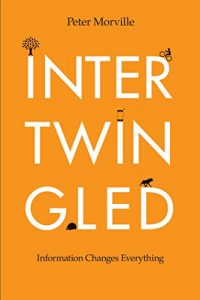 Morville, Peter. 2014. Intertwingled: Information Changes Everything. US: Semantic Studios.
Morville, Peter. 2014. Intertwingled: Information Changes Everything. US: Semantic Studios.
Intertwingled is not a practical book. It is not intended to be. Unfortunately, that will discourage those who could most benefit from its message and perspective. It’s an extended reflection by its author, Peter Morville, on the deep challenges of making information more easily accessible and impactful within organizations. Morville has written several of the essential books in the world of information design and architecture (Information Architecture, Ambient Findability). Intertwingled is a more reflective exercise; an attempt to pick a broader vantage point on understanding both the technological and organizational environments we inhabit. Morville opens with an observation from Ted Nelson:
People keep pretending they can make things hierarchical, categorizable, and sequential when they can’t. Everything is deeply intertwingled.  – Theodor Holm Nelson
I’ve never been a huge fan of the term “intertwingled” – probably because I am generally suspicious of coining “cute” new terms. Ted Nelson, on the other hand, seems drawn to the practice. Nelson’s books, Computer Lib/Dream Machines and Literary Machines, were hugely influential in luring me into the field and Morville seems to have been similarly enticed.
I don’t think Morville makes me any more comfortable with the term, but the book and his arguments and observations are still worth the time.
It’s beyond cliche that we live in an information economy. It’s easy to be distracted by the shiny stuff– apps, devices, platforms, technology. Morville’s focus is on the peculiar notion of information. Information is a surprisingly slippery term and we are all well served by efforts such as Intertwingled that make us think about that slipperiness. Morville observes that
Access to massive amounts of conflicting information from myriad sources creates filter failure. We don’t know what to believe. So we fall back on simple ways of knowing. We trust experts and those in authority. We follow doctor’s orders. Or we reject expertise completely.
Lately, it seems that rejection has become the go to strategy in many settings. This is not, in fact, a new problem. Morville, for example, offers the following observation from computer scientist Calvin Mooers published in 1959:
Many people may not want information, and they will avoid using a system precisely because it gives them information. Having information is painful and troublesome. We have all experienced this. If you have information, you must first read it, which is not always easy. You must then try to understand it. Understanding the information may show that your work was wrong, or may show that your work was needless. Thus not having and not using information can often lead to less trouble and pain.
Morville’s goal with Intertwingled is to make you think. He succeeds admirably. Enough so that this will be a book I expect to return to.